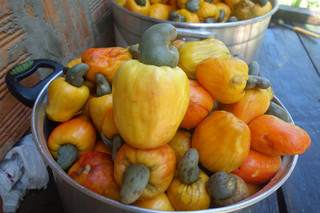Summer has already started in the Parnaíba Delta, it’s very windy and it’s getting drier every day until January, when the first rainfalls will begin. In Passarinho, a village of around 35 houses located on the Canárias Island, the second biggest island of the over 70 islands building the delta landscape, inhabitant’s work is more turned to the land than the water during this time. Lots of men are cutting Carnaúba palm (Copernicia prunifera) leaves at the moment. After letting the leaves dry in the sun during some days, they extract the precious Carnaúba wax with the help of a machine. They sell the powder wax to middlemen in Parnaíba; a part of it is exported either in the powder form or after transformation in a solid form. The Carnaúba palm is native to and grown only in the northeastern region of Brazil. The natural wax is used in a large amount of products, mainly cosmetics, food products and polishes. It is also called “Queen of the waxes” and appreciated because it’s one of the hardest wax and not soluble in water.
Women and children instead are busy with cashew gathering. The cashew fruit is composed of the cashew-apple (also called pseudofruit) and the nut which is enclosed in a sort of shell. Most of the cashew trees have been planted by some of the older or former inhabitants. Contrarily to the native cashew, which has a small and sour fruit and a small nut, the planted ones are selected according to preferences: from yellow to red, from sour to sweet, from small to big nuts. From the fruits, women make juices and sweets, only for the family’s consumption. The cashew nut is much more precious, because it’s a direct source of revenue for women: “Here, it’s difficult for women to have a job, there are no jobs. That’s why the Cashew nut is of big value, it’s the women’s salary, it allows a woman to buy her things”, explains Dona Maria. They sell the nut with the shell around it, the small one for approx. 2.50 reais/kg (0.80 euros) and the bigger ones for 3-5 reais/kg (1-2 euros), either to a middleman from their village or from Canárias, the neighbouring village. The extraction of the nut from its shell is not an easy process because it contains an oil that is skin irritating. They thus have to be roasted in the right way. While roasting them the oil burns and produces big flames. Only when the shell is all charred, it can broken and the nut can be taken out. There is however still a little skin on the nut, that has to be quit. Then, finally the nut can be consumed.
However, the cashew harvest is not every year good for all cashew trees. Indeed, inhabitants explain, that the moon, or better the lunar eclipse every year ‘burns’ a part of the developing cashew fruits and sometimes even the nuts, resulting in a poor harvest. This year it happened among others to Dona Ozima’s cashew trees: the eclipse burnt almost all the fruits in her garden. To lead with this uncertainty, people either have to gather more in the forest or they rely on family bonds. Dona Ozima, for example, went collecting cashews in her niece´s garden and in exchangegave her coconuts from her garden.
The intensity of cashew gathering varies according to the person’s or family’s need. If there is a special event upcoming (birthday, marriage, birth of a child, etc.), the gathering activity will be temporarily more intense and more people, especially children and men who do not have another job to do, participate. Thus just before the festivity of the Saint of Passarinho, Sao Luis Gonzaga, that takes place in late October, people will gather more cashew nuts in order to buy some new clothes for this event.
Interestingly, some other, non-human beings participate actively in the cashew nut gathering activity. Indeed, cows that are raised freely, eat during the day a lot of cashew fruits, including the nuts with the shell. However, they will not chew the nut, instead they swallow it entirely. During the night, they stay close to the house and as they can’t digest the nuts, they spill them out again. In the morning, the owner of the cows only has to pick up the nuts spilled out by his cows. The help of cows is especially appreciated because they carry home cashew nuts that are of difficult access for humans, because they are distant or inside a denser vegetation. Another non-human agent intervenes in this process: mosquitos. The owner of the cows knows that his cows will only come back to sleep close to the house if he produces smoke. The smoke will keep away the mosquitos; the cows thus opt to come to sleep close to the smoke instead of staying outside.

